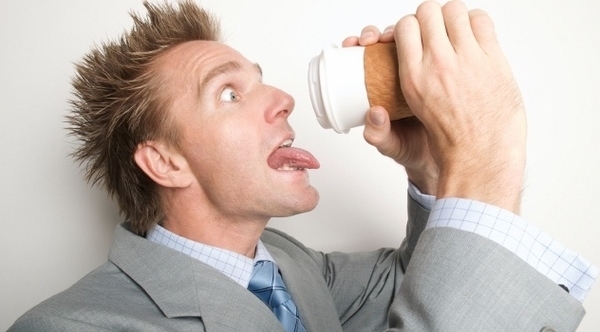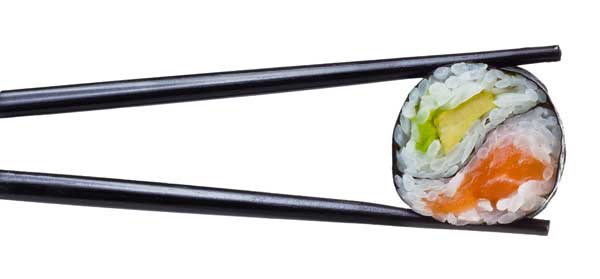Is Caffeine Bad for You?

Do you depend upon a jolt of caffeine to wake you up in the morning or get you through your mid-afternoon slump? Perhaps you down a cup of coffee before your workout to boost energy levels. If so, you aren’t alone! Whether it’s through coffee, tea, caffeinated soda or energy drinks, many of us  consume caffeine to wake us up and keep us going. Caffeine is known for its stimulating effects on the nervous system. It alleviates fatigue and improves concentration and focus. However the perks of caffeine have been frequently debated – is caffeine bad … or can it actually be good?
consume caffeine to wake us up and keep us going. Caffeine is known for its stimulating effects on the nervous system. It alleviates fatigue and improves concentration and focus. However the perks of caffeine have been frequently debated – is caffeine bad … or can it actually be good?
Ninety percent of people in the world use caffeine in one form or another. In the U.S., 80 percent of adults consume caffeine every day – the average adult has an intake of 200 mg per day, the amount in two 5-ounce cups of coffee or four sodas. Caffeine is a subject of great debate. I frequently hear people say they are giving up caffeine in attempts of living a healthier lifestyle. Why? They feel jittery? It’s addictive? Want to feel “pure”? I decided to do a little investigation on the effects of caffeine – the good, the bad and questionable.
Caffeine 101
Caffeine occurs naturally in more than 60 plants including coffee beans, tea leaves, kola nuts used to flavor soft drink colas, and cacao pods used to make chocolate products. Man-made caffeine is sometimes added to foods, drinks, and medicines. It is a unique compound because it is considered both a food component and a drug.
Caffeine is a psychoactive stimulant that is absorbed and distributed very quickly through the body. After digestion, the caffeine passes into the brain, where it begins to stimulate the central nervous system, blocking fatigue-inducers called adenosine receptors. As your central nervous system becomes stimulated, your pituitary and hypothalamus glands release stress hormones such as ephinedrine and cortisol, enabling a fight-or-flight response in your body. This blog post will describe some of the effects of caffeine in the body. Because this post is discussing some medical effects on the body, I included many references. But please check with your doctor if you have any concerns about caffeine and your health!
Effects of caffeine in the body
Improves focus, mood and alertness. You aren’t grabbing that cup of coffee just because it tastes good! Numerous studies have documented that caffeine doses improve focus, mood and alertness. Reference But more is not better – as too much caffeine can have negative effects in some people (will be described below).
Enhances physical performance. Consuming caffeine 10-60 minutes before exercise can improve mental focus, alertness, anaerobic performance,  and/or endurance performance. Reference #1, #2, #3
and/or endurance performance. Reference #1, #2, #3
Blood pressure. Caffeine can temporarily increase blood pressure and heart rate immediately following consumption. Some people are more sensitive than others. To see if caffeine might be raising your blood pressure, check your blood pressure within 30 to 60 minutes of drinking a cup of coffee or another caffeinated beverage. If your blood pressure increases by five to 10 points, you may be sensitive to the blood pressure raising effects of caffeine. If you have persistent high blood pressure, check with your doctor about caffeine intake. Reference #1
Osteoporosis. At high levels (more than 744 milligrams/day), caffeine may increase calcium and magnesium loss in urine. But recent studies suggest it does not increase your risk for bone loss, especially if you get enough calcium. You can offset the calcium lost from drinking one cup of coffee by adding just two tablespoons of milk. However, research does show some links between caffeine and hip fracture risk in older adults. Older adults may be more sensitive to the effects of caffeine on calcium metabolism. If you’re an older woman, discuss with your doctor whether you should limit your daily caffeine intake to 300 milligrams or less. This was taken from WebMD
Hydration. For many years it was believed that caffeine caused dehydration. Newer research suggests that caffeinated beverages may in fact contribute towards fluid requirements when consumed in moderation, especially for habitual caffeine consumers. However this does NOT mean that you should meet the majority of your fluid needs with caffeinated beverages! Reference
GI upset. Caffeine can worsen gastro-intestinal problems like IBS or diarrhea. The Diarrhea Dietitian (yes – that is her name!) says caffeine speeds up gastrointestinal (GI) motility and makes everything move through faster by the diarrhea dietitian But maybe this is a good thing if you are constipated! Reference

Exacerbate stress. Feeling stressed? You may want to avoid caffeine. A study by researchers at Duke University Medical Center shows that caffeine taken in the morning has effects on the body that persist until bedtime and amplifies stress consistently throughout the day. These results show that the effects of caffeine last considerably longer than originally thought and that caffeine exaggerates stress in people who consume it every day. “The effects of coffee drinking are long-lasting and exaggerate the stress response both in terms of the body’s physiological response in blood pressure elevations and stress hormone levels, but it also magnifies a person’s perception of stress.
Jitters. Although moderate caffeine intake isn’t likely to cause harm, too much can lead to some unpleasant effects.Heavy daily caffeine use — more than 500 to 600 mg a day (4 cups of more) may cause: nervousness, restlessness, irritability, stomach upset, fast heartbeat, muscle tremors. Some people are more sensitive to caffeine than others.
Insomnia. Caffeine may affect your sleep depending upon what you have it. It is rapidly absorbed through the stomach lining, and reaches the bloodstream in within 30-45 minutes. It takes about 5-7 hours, on average, for 50% of caffeine to be eliminated from your body. After 8-10 hours, 75% is eliminated. Not everyone react the same way to caffeine. But if you a poor sleeper, most health experts recommend avoiding caffeine past 3 pm. Reference
Cancer. In the past it was believed that caffeine may increase risk of certain cancers. Newer studies do not back this up – on the contrary, a growing number of studies are investigating caffeine’s possible role in cancer prevention. Reference
Pregnancy. Pregnant women are urged to limit their intake of caffeine to 200mg/day or less. Although no research has shown that caffeine causes birth defects in humans, we do know that caffeine does cross the placenta and does reach the fetus. A breast-fed child can get caffeine from a nursing mother’s breast milk, which may cause the baby to become fussy. Therefore, it is good for both pregnant and nursing women to limit the amount of caffeine. Reference
defects in humans, we do know that caffeine does cross the placenta and does reach the fetus. A breast-fed child can get caffeine from a nursing mother’s breast milk, which may cause the baby to become fussy. Therefore, it is good for both pregnant and nursing women to limit the amount of caffeine. Reference
Insulin resistance. The role of caffeine consumption on insulin action is still under debate, however numerous studies show that caffeine ingestion decreases insulin sensitivity. Reference #1 #2 #3
Cardiac arrhythmia. In the past, we were told that caffeine could cause uneven heart rhythms. However a recent review of studies suggest that in most patients with known or suspected arrhythmia, caffeine in moderate doses is well tolerated. Also, a seven-year Danish study also found no association between caffeine consumption and the development of atrial fibrillation (Frost and Vestergaard, 2005). That being said, many great physicians I consult with tell their patients to avoid or strictly limit caffeine intake. In this case, “doctor knows best!” Reference #1,
GERD. Many health professionals will tell you to avoid caffeine if you have GERD. But it doesn’t bother everyone. Pay attention to how caffeinated beverages make your symptoms feel
Elevated blood sugar. Caffeine may have a small but detectable effect of raising blood glucose in type 2 diabetics. The exact mechanism is unclear – however it is theorized that caffeine might cause a surge of adrenalin or cortisol which elevates blood sugar, or caffeine may alter the function of insulin. Reference
Change in hunger levels. Research is mixed as well. Caffeine may have an effect of quelling your appetite – at least at initially. When consuming caffeine, your perceived energy levels remain at a peak, while your blood sugar steadily declines. After the caffeine has reached its highest concentration in your blood, you may experience a crash or sudden energy drop that is accompanied by hunger pangs – causing the urge to eat. This effect varies person to person. Reference
Potential toxicty. ‘Energy drinks’, ‘energy shots’ and other energy products have exploded in popularity in the past several years; however, their use is not without risk. Caffeine is the main active ingredient in energy drinks, and excessive consumption may acutely cause caffeine intoxication, resulting in tachycardia, vomiting, cardiac arrhythmias, seizures, and death. Many dietary supplements being promoted for weight loss contain caffeine- or ephedra-related alkaloids to increase energy and suppress appetite. People may be unaware that supplements can contain caffeine, even if caffeine is not listed as an ingredient. Commonly used herbal dietary supplement ingredients, such as guarana, are natural sources of caffeine. Additions of these natural sources of caffeine to dietary supplements have increased in recent years. References #1, #2
Caffeine Content of Beverages, Food and Drugs
| Soft Drinks 12 ounces | Milligrams of caffeine |
| Mountain Dew® | 55 |
| Coca-Cola®, Cherry Coke®, Diet Coke®, Diet Cherry Coke® | 23-31 |
| Pepsi® | 43 |
| Diet Pepsi® | 36 |
| Dr. Pepper® | 61 |
| RC Cola® | 34 |
| Diet RC® | 33 |
| Cherry RC® | 12 |
| Coffee 8 ounces | |
| Drip | 95-200 |
| Percolator | 110 |
| Instant | 68 |
| Espresso (single,2ounces) | 100 |
| Decaffeinated | 2-12 |
| Tea 8 ounces | |
| Brewed, black | 40-120 |
| Instant | 25-62 |
| Green | 20-36 |
| Energy Drinks (one serving) | |
| Sobe no Fear® (16 ounces) | 166 |
| Full Throttle® (16 ounces) | 144 |
| Red Bull® (8.5 ounces) | 80 |
| Sobe Adrenaline Rush® (8.3 ounces) | 79 |
| AMP® (8.4 ounces) | 75 |
| Jolt Cola® (12 ounces) | 72 |
| Vault® (12 ounces) | 70 |
| Chocolate | |
| Chocolate bar (1.55 ounces) | 11 |
| Cocoa/Hot chocolate (8 ounces) | 21 |
| Chocolate milk (8 ounces) | 5 |
| Chocolate Ice Cream (1/2 cup) | 2 |
| Medicines | |
| Vivarin® | 200 |
| No Doz® | 100 |
| Excedrin® | 65 |
| Anacin®, Vanquish®, Midol® | 33 |
Caffeine Content of Common Beverages, 2009. Food Values of Portions Commonly Used by J. Pennington, Philadelphia: Lippincott, 2005.
My personal observations. As I have gotten older, I have become very sensitive to the effects of caffeine. I tend to get very edgy and feel “weird” if I drink too much of it. The feeling I get is almost like I have low blood sugar and need to eat ALOT to get rid of it. I used to be the venti Starbucks queen. No more! The last time I had a venti, I had rapid heart rate for a few days. This scared me (as my dad has afib). I also have sleep issues. So I need to be careful with my caffeine intake. On the other hand, I love the pick-up caffeine gives me in the morning the afternoon and before a workout. My compromise – I make a 1/2 decaf 1/2 regular coffee in the morning and frequently have another one at 3 pm.
Bottom line – most healthy adults can safely consume up to 400 mg of caffeine a day. But if you are at high risk for complications (i.e. high blood pressure, anxiety syndrome. very stressed, cardiac arrhythmia, i.e.) it’s recommended that you check with your doctor. If you are sensitive to caffeine, have sleep issues or are stressed, pay attention to how your body caffeine makes your body feel. You will likely feel better by cutting back. However it’s recommended that you cut back slowly as an abrupt decrease in caffeine may cause caffeine withdrawal symptoms such as headaches, fatigue, irritability and nervousness. Fortunately, these symptoms are usually mild and resolve after a few days.
How much caffeine do you consume a day and how does it make you feel?
RELATED POSTS
MEET MARTHA
I especially love problem-solving, whether it’s helping women defeat issues plaguing them for years, helping a busy executive find practical ways to get heart healthy, or providing tips to help you reverse diabetes. That’s why I’m on a constant quest to expand my knowledge by staying on top of the latest research.

20 Ways To Eat Out 550 Calories or Less!
No time to cook? We’ve got you covered. Here are 20 healthy meals from a variety of cuisines that won’t pack on the pounds. Most of them also have less than 30 grams of carbs.
Subscribe to my newsletter and get this free download.


